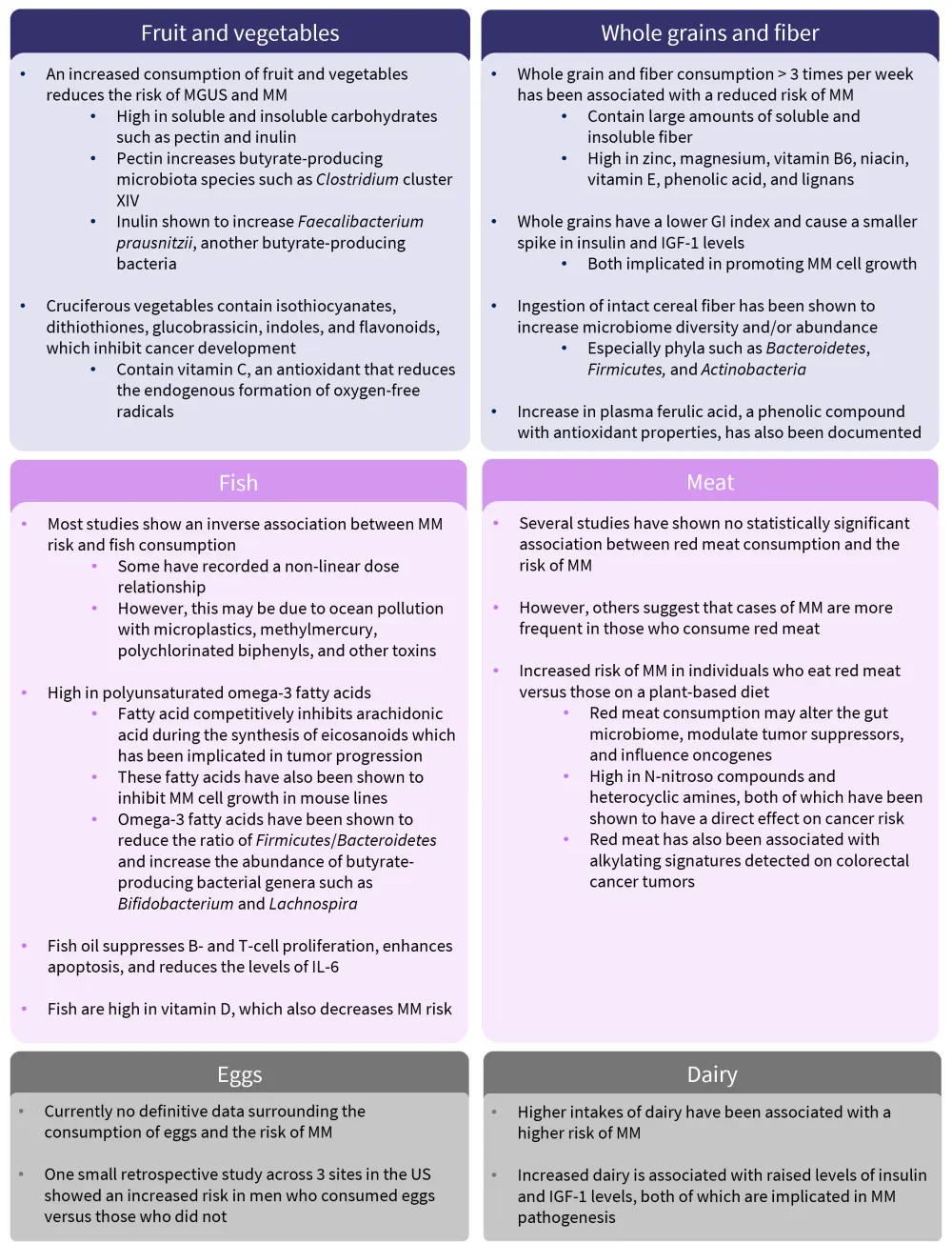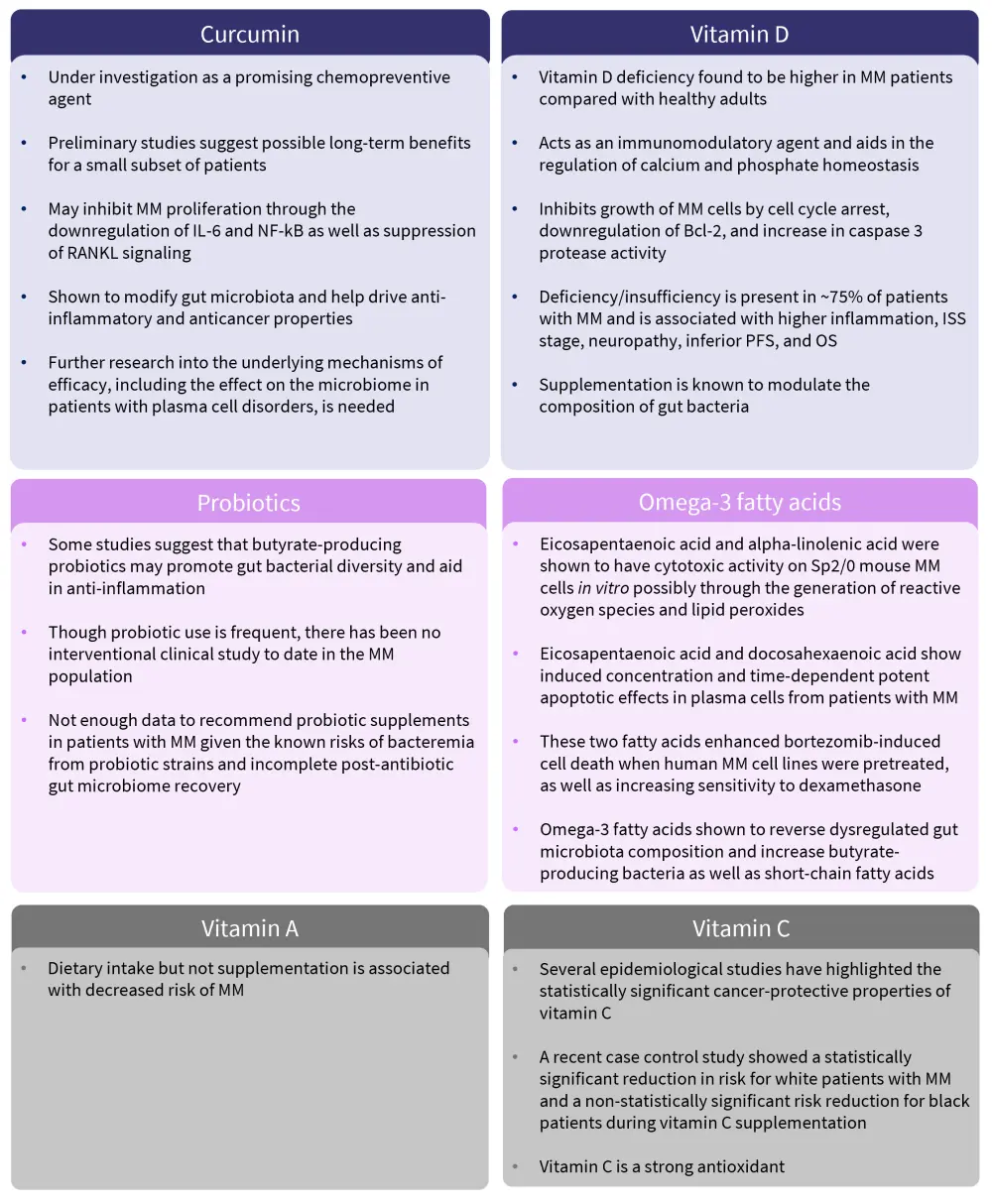All content on this site is intended for healthcare professionals only. By acknowledging this message and accessing the information on this website you are confirming that you are a Healthcare Professional. If you are a patient or carer, please visit the International Myeloma Foundation or HealthTree for Multiple Myeloma.
The mm Hub website uses a third-party service provided by Google that dynamically translates web content. Translations are machine generated, so may not be an exact or complete translation, and the mm Hub cannot guarantee the accuracy of translated content. The mm and its employees will not be liable for any direct, indirect, or consequential damages (even if foreseeable) resulting from use of the Google Translate feature. For further support with Google Translate, visit Google Translate Help.
The Multiple Myeloma Hub is an independent medical education platform, sponsored by Bristol Myers Squibb, GSK, Legend Biotech, Pfizer, and Roche. Funders are allowed no direct influence on our content. The levels of sponsorship listed are reflective of the amount of funding given. View funders.
Now you can support HCPs in making informed decisions for their patients
Your contribution helps us continuously deliver expertly curated content to HCPs worldwide. You will also have the opportunity to make a content suggestion for consideration and receive updates on the impact contributions are making to our content.
Find out more
Create an account and access these new features:
Bookmark content to read later
Select your specific areas of interest
View multiple myeloma content recommended for you
MM risk: Influences of diet and the microbiome
Do you know... Vitamin D deficiency is regularly found to be higher in patients diagnosed with MM compared with healthy adults. What percentage of patients are thought to be deficient in vitamin D?
Multiple myeloma (MM) is the second most commonly diagnosed hematologic malignancy and is characterized by the neoplastic proliferation of plasma cells.1 While continued research and the development of new treatments for MM have improved survival rates of patients, it is becoming increasingly important to address dietary and lifestyle factors in order to maximize positive clinical outcomes. In particular, diet and microbiome composition play key roles in the absorption and utilization of energy gained from nutritional intake, whilst influencing immunologic stimuli and the regulation of cytokine secretion in intestinal epithelial cells.
Existing and emerging data clearly demonstrate the impact of changes in the gut microbiome on the development of certain malignancies through increased inflammation and other host-microbiome interactions.1
Recently, Shah et al.1 published a review of current evidence on diet and the microbiome as potential modifiers of MM risk and the mechanisms by which these factors may influence disease development and progression. We summarize the key findings here.
Impact of dietary components on MM risk
Diet remains one of the major modifiable risk factors for cancer. Several dietary components have been shown to significantly influence the risk of developing MM, as summarized in Figure 1. The effects of certain vitamins and minerals on MM risk are outlined in Figure 2.
Figure 1. Influence of individual dietary components on MM*

GI, glycemic index; IGF-1, insulin growth factor-1; IL-6, interleukin-6; MGUS, monoclonal gammopathy of undetermined significance; MM, multiple myeloma.
*Adapted from Shah, et al.1
Figure 2. Influence of vitamins and minerals on MM*

IGF-1, insulin growth factor-1; IL-6, interleukin-6; ISS, International Staging System; MM, multiple myeloma; NF-kB, nuclear factor-kappa B.
*Adapted from Shah, et al.1
Alcohol and smoking
- There are currently contradictory results regarding alcohol consumption and the risk of MM when compared with overall cancer risk; some studies have even indicated an inverse association.
- This may reflect the immune system impairment in heavy drinkers, but the enhancement of cellular and immune responses in light drinkers.
- Low alcohol consumption has also shown improved insulin sensitivity, leading to a decrease in the risk of diabetes and obesity; both of which are related to plasma cell disorders.
- In addition, red wine contains the antioxidant resveratrol, which has been shown to induce apoptosis, modulate gut microbiota, and suppress T-helper 17 lymphocytes, which are involved in MM pathogenesis.
- There is currently no clear link between smoking and the risk of MM.
Microbiome
- Intestinal dysbiosis is common in patients with MM.
- Alpha diversity has been shown to be significantly decreased in patients with MM compared with healthy individuals, along with higher levels of Bacteroides, Faecalibacterium, and Roseburia genera.
- Some studies have highlighted an association between intestinal microbiota composition and deeper treatment responses.
- Higher levels of butyrate producers have been associated with sustained measurable residual disease.
- Several ongoing studies are investigating nutritional strategies to positively modulate the gut microbiota, including:
- NUTRIVENTION (NCT04920084), which is investigating nutrition-based intervention for patients with elevated body mass index and monoclonal gammopathy of undetermined significance or smoldering MM.
- NCT05640843, which is evaluating a whole food plant-based diet compared with omega‑3 fatty acids and curcumin supplements and placebo.
- PROFAST (NCT05565638), which is investigating prolonged nightly fasting in patients with monoclonal gammopathy of undetermined significance and smoldering MM and elevated body mass index.
Conclusion
The risk of MM has been shown to be lower in individuals who eat a plant-based diet when compared with meat eaters. The consumption of fruit, cruciferous vegetables, fish, and whole grains have all been shown to reduce the risk of MM. Patients diagnosed with MM consistently present with a vitamin D deficiency, which negatively impacts myeloma activity, bone turnover, and survival outcomes. Dysregulation of the microbiome is regularly observed in patients with MM, and several studies are currently investigating the effects of diet and supplementation, with a particular emphasis on increasing butyrate-producing bacteria.
References
Please indicate your level of agreement with the following statements:
The content was clear and easy to understand
The content addressed the learning objectives
The content was relevant to my practice
I will change my clinical practice as a result of this content
Your opinion matters
On average, how many patients with MGUS/smoldering MM do you see in a month?




